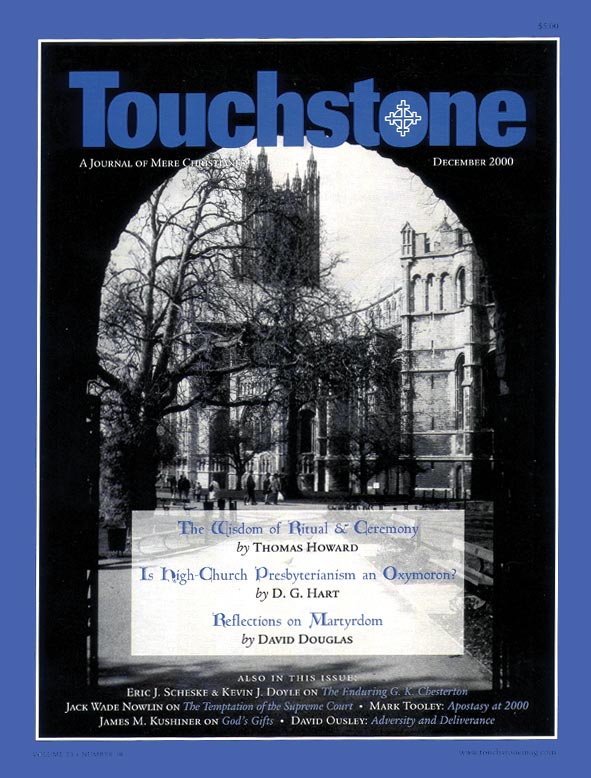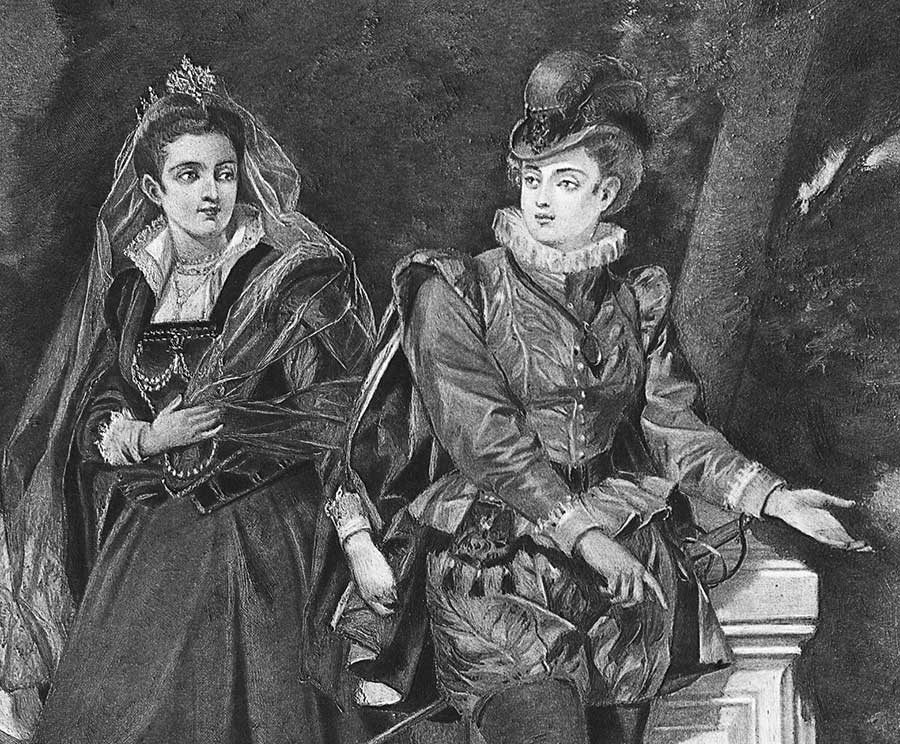Holy Things
But as for you, continue in what you have learned and have firmly believed, knowing from whom you have learned it and how from childhood you have been acquainted with the holy scriptures which are able to instruct you for salvation through faith in Christ Jesus. All scripture is inspired by God and profitable for teaching, for reproof, for correction, and for training in righteousness, that the man of God may be complete, equipped for every good work.
—2 Timothy 3:14–16
While on a recent trip to Dublin, I had the opportunity to view the Book of Kells. This 1,200-year-old Gospel book is a tremendous document—the ornate illustrations accompanying the holy text are beautiful and haunting. It is a wonderful reminder of the magnificence of Celtic Christianity. In a strange way, I believe it is a good example of how modern society views the ancient Church and her teachings.
The Book of Kells is a museum piece. It is viewed in a display case, a new page shown every day, and its Latin script is admired for its beautiful calligraphy, but its words go unread. The purpose of the beautiful book—to house sacred text—has been all but lost.
But the words of Christ were not meant to be admired simply for their beauty. The Sermon on the Mount was not given to supply pithy sayings for the greeting cards of future generations. The Incarnation was not meant to be the reason for a holiday shopping spree. The Crucifixion was not meant to provide a simple and easy-to-make design for future jewelers.
But the very foundations of our ancient faith—the teachings of our Lord, the apostles, and the ancient Church—are treated this way by many today. They are considered quaint items of historical curiosity, hardly applicable in the postmodern world (whatever that is).
The same day I saw the Book of Kells, the Irish Catholic bishops announced a proposal to drop many Pauline Epistle readings from the Lectionary because they are considered offensive to modern sensibilities. Apparently St. Paul is no longer welcome on St. Patrick’s Isle.
Even when he wrote his Epistles, Paul expected that they would not be well received. This is why he wrote to the Thessalonians, “If any man obey not our word by this epistle, note that man, and have no company with him, that he may be ashamed.”
Paul, of course, meant that those who did not follow his teachings should be ashamed, not the other way around. We do ourselves, the church fathers, and, most importantly, our Lord a disservice if we allow ourselves to be ashamed of following the instructions of the Scriptures.
That Christianity is admired because of certain beautiful artifacts while its teachings are ignored, or worse, scorned, is perhaps nothing new. The beauty of holy things, including the words of Scripture, isn’t always as easily discernible to those without eyes of faith as is the beauty of the Book of Kells. Holy things have been touched by the sacred, and those whose lives are drawn to the sacred rather than the profane will always find them beautiful. Holy things remind us of the living God, for they have his mark, his touch, and are not just items of historical interest. That others would find holy things to be empty apart from their physical beauty or historical import is hardly a surprise. For us, we need to cultivate eyes of faith so that we can see the beauty of the hand of God in all his work, and not be embarrassed to incorporate such things into our homes and into our lives.
Thomas S. Buchanan is the George W. Laird Professor of Mechanical Engineering and Biomedical Engineering at the University of Delaware. He has studied at UCSD, Northwestern University, and MIT, and has held visiting professorships at the University of Western Australia and the University of Aix-Marseille. He has served as department chairman, deputy dean, and institute director, president of the American Society of Biomechanics, and editor-in-chief of the Journal of Applied Biomechanics. He is on the Board of Trustees of Saint Katherine College, the editorial board of Touchstone, and the board of The Fellowship of St. James.
bulk subscriptions
Order Touchstone subscriptions in bulk and save $10 per sub! Each subscription includes 6 issues of Touchstone plus full online access to touchstonemag.com—including archives, videos, and pdf downloads of recent issues for only $29.95 each! Great for churches or study groups.
Transactions will be processed on a secure server.
more from the online archives

33.1—January/February 2020
Do You Know Your Child’s Doctor?
The Politicization of Pediatrics in America by Alexander F. C. Webster

15.6—July/August 2002
Things Hidden Since the Beginning of the World
The Shape of Divine Providence & Human History by James Hitchcock
calling all readers
Please Donate
"There are magazines worth reading but few worth saving . . . Touchstone is just such a magazine."
—Alice von Hildebrand
"Here we do not concede one square millimeter of territory to falsehood, folly, contemporary sentimentality, or fashion. We speak the truth, and let God be our judge. . . . Touchstone is the one committedly Christian conservative journal."
—Anthony Esolen, Touchstone senior editor









